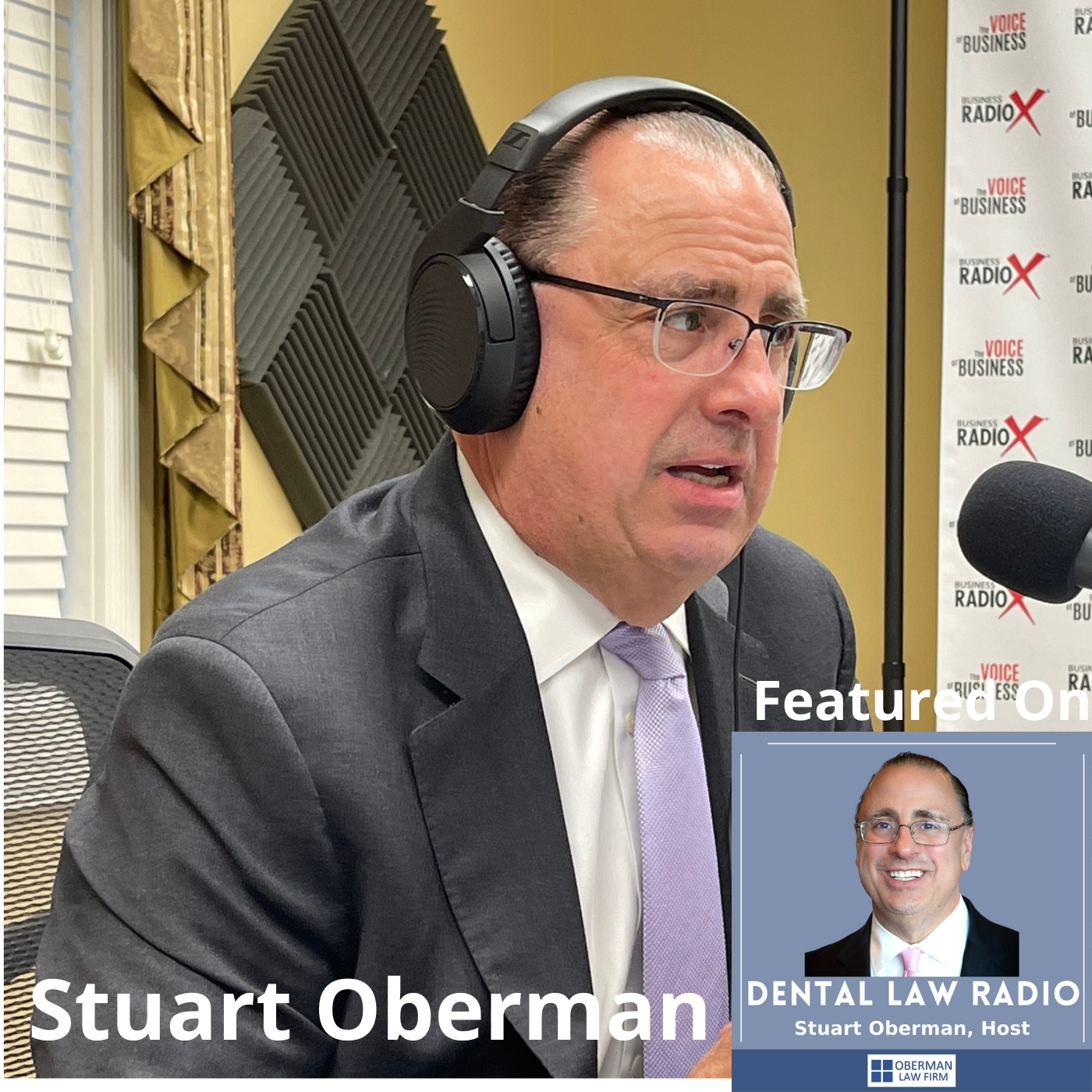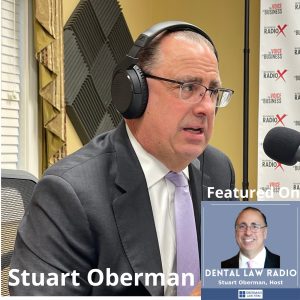

Covid 19 – Delta Variant Mandates & Legal Liability (Dental Law Radio, Episode 16)
Do you require all your employees receive the Covid-19 vaccine? How do you deal with employee resistance? What are reasonable accommodations, mandated in federal law, and how do you navigate them? There’s a lot to think about before you dive in with a poorly thought-out policy, and Stuart Oberman sorts out the issues in this episode. Dental Law Radio is underwritten and presented by Oberman Law Firm and produced by the North Fulton studio of Business RadioX®.
TRANSCRIPT
Intro: [00:00:01] Broadcasting from the Business RadioX studios in Atlanta, it’s time for Dental Law Radio. Dental Law Radio is brought to you by Obermann Law Firm, a leading dental-centric law firm serving dental clients on a local, regional and national basis. Now, here’s your host, Stuart Oberman.
Stuart Oberman: [00:00:26] Hello, everyone, and welcome to Dental Law Radio. The hot topic, that is on a national basis. We’re going to talk, in a multipart series, we’re going to first cover COVID-19 Delta variant mandates and legal liability. Then, we’re going to jump into a couple other areas on the next subsequent podcasts, such as must-have policies and employer job interviews.
Stuart Oberman: [00:01:00] So, there’s been enormous amount of buzz in our office and across the country as to what is going on and required with employees COVID-19 testing, non-testing, mandates, no mandates. So, we’re going to cover some areas on this multipart series. First, I want to take a look at the complex governmental oversight, which it’s all pretty much federal based. So, one of the things driving the mandates is you’ve got federal law, of course. You’ve got OSHA, you’ve got the CDC, the EEOC, the EEO, and the FDA. And if that is not enough acronyms for you, we could probably think of some more.
Stuart Oberman: [00:01:56] So, when all these regulatory matters come out, and the government pushes all these mandates, they’re literally encompassing all these laws, and it is a trap for the unwary, as we say. And I know I’ve said this before in our podcast, but you cannot, under any circumstances, delegate these kind of oversight matters to just anyone in your office. These are very specific guidelines, very specific procedures, and they have to be taught, learned by your staff, and they have to know where to go for this advice.
Stuart Oberman: [00:02:39] So, let’s jump into the topic. So, employee resistance, now what? Okay. So, employees are vaccinated, great, everyone’s happy. But the problem is anywhere from probably 10 to 30 percent of our dental practices have employees, 10 to 30 percent of dental practices, the employees are not vaccinated. So, now, what do you do? So, you’re thinking to yourself, “Okay, I’ll mandate it.” Great. That’s a problem, because now you’ve got to seek guidance from the American Disabilities Act, the EEOC. So, you’re thinking, “Well, how in the world is the Americans with Disabilities Act even come into play for this?” So, under the ADA, it outlines guidelines for employers who refuse to get vaccinated. Employers must have and provide reasonable accommodations. That is a very nebulous term, and there is a lot of moving pieces.
Stuart Oberman: [00:03:41] So, then you say, “Well, what do you do if employees have disabilities?” So, now, you go back under the ADA that says you cannot impose an undue burden on an employer. So, now, you’ve got sort of a dichotomy. Well, we have employees that do not want to get vaccinated, and they have disabilities, and you’ve got to accommodate them. So, then, on the other side of the fence, you say, “Well, employees have disabilities. I cannot, as an employee, impose an undue burden on an employer. So, what exactly is a reasonable accommodation?” It’s all over the map. So, you have job restructuring, part-time remodify job schedules. You’ve got acquiring or modifying equipment. That is just the tip of what the complex governmental matters oversight look at.
Stuart Oberman: [00:04:37] So, now, we say, “Well, I’m going to mandate.” All right. So, now, we say great, mandates. What should be in a vaccination policy that’s mandated? That is a whole different world. So, we’re going to walk through a couple scenarios. This whole topic that we’re talking about today can literally be an eight-hour topic, but we’re going to have to drill it down and piecemeal it over certain segments.
Stuart Oberman: [00:05:10] So, the policy should clearly identify that employees – this is mandatory policy now, employees will be required to demonstrate proof of vaccination. Now, here’s a critical point. Any employee files regarding vaccination, non-vaccination requirements, accommodations, whatever it is, have to be kept separate from a personnel file. So, first and foremost, employees should never have control of their own personnel files. That is a recipe for disaster. So, then, you have to say, “Well, I have employees who do not choose to get vaccinated.” So, then, they’ve got to provide religious or medical reasons. So, any mandatory policy should clearly set forth process by which employees can request an exemption or accommodation.
Stuart Oberman: [00:06:12] You’re thinking, “Well, I have no policy.” That is problematic, and you probably need to call your lawyer, because if you’re trying to mandate these policies, and implement certain things, and push certain procedures and you don’t have a written policy, which we’re going to cover a little bit, else you’ve got some problems.
Stuart Oberman: [00:06:35] So, what do you do if employees choose not to get vaccinated? So, there’s got to be a medical or religious reason, you got to set forth the exemption. And what if an employee declines because of a medical condition? What do you do? Or as we say, sincerely-held religious belief, what do you do? These are all exemptions. So, at a minimum. Any policy you have should identify which employees should notify or should be notified regarding receiving accommodation. How do you request one? How do you request one?
Stuart Oberman: [00:07:14] Now, ultimately, what happens is, is that under no circumstances, and you have any retaliatory measures whatsoever, if you have an employee or employees who refuse to get vaccinated, you cannot retaliate against them under federal law. That is a whole different set of problems.
Stuart Oberman: [00:07:36] Now, if employees are required to be mandated for vaccinations, they have to substantiate an exemption, and you also have to supply an exemption process as far as forms go. And we’re going to cover that a little bit later. Because otherwise, you have no reasonable basis for determining whether or not an exemption exists. So, the policy should be very clearly stated that anyone who fails to become vaccinated by a certain deadline will face certain consequences. You cannot arbitrarily do that. You’ve got to set that out in writing.
Stuart Oberman: [00:08:22] Okay. So, now, we cover two areas. And in this segment, we’re going to cover one more area. So, the first area we covered is that this complex governmental oversight. Then, you have, of course, employee resistance, and now what? So, I want to touch base a little bit on policy mandates. Under the particular mandates, we’re going to go into a deep dive on the next segment as to mandatory/non-mandatory, mandatory vaccination policies, non-mandatory vaccination policies, accommodation procedures, requests for medical exemptions, accommodations related to the vaccination, and request for religious exemptions and accommodations.
Stuart Oberman: [00:09:17] So, those are must-have policies that you have to have in place. And we’re going to go into a little bit of a deep dive on this on our next segment. But for now, take a look at what your policies are, what mandates that you have, what you do and do not want to mandate, whether or not you want to set a deadline as far as mandates go. For this segment, that is all for Dental Law Radio. And I will say this, my friends, always heed this legal advice, keep your friends close, your lawyer closer in this environment. Thank you, guys. Have a great day. And we will see you at our next segment.
About Dental Law Radio
Hosted by Stuart Oberman, a nationally recognized authority in dental law, Dental Law Radio covers legal, business, and other operating issues and topics of vital concern to dentists and dental practice owners. The show is produced by the North Fulton studio of Business RadioX® and can be found on all the major podcast apps. The complete show archive is here.
Stuart Oberman, Oberman Law Firm

Stuart Oberman is the founder and President of Oberman Law Firm. Mr. Oberman graduated from Urbana University and received his law degree from John Marshall Law School. Mr. Oberman has been practicing law for over 25 years, and before going into private practice, Mr. Oberman was in-house counsel for a Fortune 500 Company. Mr. Oberman is widely regarded as the go-to attorney in the area of Dental Law, which includes DSO formation, corporate business structures, mergers and acquisitions, regulatory compliance, advertising regulations, HIPAA, Compliance, and employment law regulations that affect dental practices.
In addition, Mr. Oberman’s expertise in the health care industry includes advising clients in the complex regulatory landscape as it relates to telehealth and telemedicine, including compliance of corporate structures, third-party reimbursement, contract negotiations, technology, health care fraud and abuse law (Anti-Kickback Statute and the State Law), professional liability risk management, federal and state regulations.
As the long-term care industry evolves, Mr. Oberman has the knowledge and experience to guide clients in the long-term care sector with respect to corporate and regulatory matters, assisted living facilities, continuing care retirement communities (CCRCs). In addition, Mr. Oberman’s practice also focuses on health care facility acquisitions and other changes of ownership, as well as related licensure and Medicare/Medicaid certification matters, CCRC registrations, long-term care/skilled nursing facility management, operating agreements, assisted living licensure matters, and health care joint ventures.
In addition to his expertise in the health care industry, Mr. Oberman has a nationwide practice that focuses on all facets of contractual disputes, including corporate governance, fiduciary duty, trade secrets, unfair competition, covenants not to compete, trademark and copyright infringement, fraud, and deceptive trade practices, and other business-related matters. Mr. Oberman also represents clients throughout the United States in a wide range of practice areas, including mergers & acquisitions, partnership agreements, commercial real estate, entity formation, employment law, commercial leasing, intellectual property, and HIPAA/OSHA compliance.
Mr. Oberman is a national lecturer and has published articles in the U.S. and Canada.
Oberman Law Firm
Oberman Law Firm has a long history of civic service, noted national, regional, and local clients, and stands among the Southeast’s eminent and fast-growing full-service law firms. Oberman Law Firm’s areas of practice include Business Planning, Commercial & Technology Transactions, Corporate, Employment & Labor, Estate Planning, Health Care, Intellectual Property, Litigation, Privacy & Data Security, and Real Estate.
By meeting their client’s goals and becoming a trusted partner and advocate for our clients, their attorneys are recognized as legal go-getters who provide value-added service. Their attorneys understand that in a rapidly changing legal market, clients have new expectations, constantly evolving choices, and operate in an environment of heightened reputational and commercial risk.
Oberman Law Firm’s strength is its ability to solve complex legal problems by collaborating across borders and practice areas.
Connect with Oberman Law Firm:
Company website | LinkedIn | Twitter















